#like midsommar is not in fact a documentary on cults
Photo






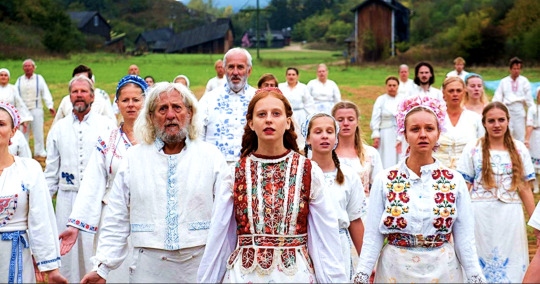


“I think we were doing this dance where we’re trying to keep everything simultaneously grounded and up in the clouds.”
- “Ari Aster on his new film Midsommar: ‘I keep telling people I want it to be confusing’” by Alyssa Wilkinson
#midsommar#ari aster#notes from the chills#folk horror#horroredit#midsommaredit#midsommar 2019#this is partially in response to seeing too many ppl taking this movie entirely at face value#like midsommar is not in fact a documentary on cults#manipulating poor innocent girls#it's a folk horror!#it's a fairy tale! but like the old kind with tons of fucked up stuff happening#it's abt surrendering to the horror! and the total relief of that surrender
210 notes
·
View notes
Note
Favorite movies/tv shows of 2019, and why? (Also, I really like your posts and hope you post more stuff!
Thanks so much! More posts are incoming. And sorry for taking so very long to answer this.
To be honest, I don’t watch a ton of contemporary stuff. I tend to think it’s healthier to take advantage of the great wealth of great art (or weird-but-interesting art) made in all time periods than to focus on keeping up with the present. Not that I don’t watch any contemporary things, I just don’t prioritize it in any way. So this list isn’t based on me watching everything and then picking out the best. It’s based on me watching a few things and liking some of them. But I hope that even if this list isn’t any more interesting than a list of awards ceremony nominations, I might at least have something worthwhile to say about the things in question.
Recent TV:
(I’m cheating and including TV from 2017-2019 that I watched in the last year or two, or else the list would be pretty boring and short.)
Succession (2018-present) - Maybe my favorite of the shows on this list, which is surprising to me because it’s not the kind of show I normally like. I don’t tend to care about rich people being mean to each other, or art that is glossily timely. I don’t get off on seeing the private dramas of powerful, immoral people. What I like about Succession is the sense of fragility and desperation that infuses it. It’s about the human desire for these stable institutions—families, kings, corporations—and whether or not they’re actually stable, and whether or not they should be destabilized. The whole thing is just a wonderfully rich text that has been made with a lot of craft. It’s nice to know that there are people making art that is very much about the present, and has something interesting to say about it.
Fleabag (2016-present) - The second season has gotten a lot of deserved praise, so I’m not going to dwell on its merits. It’s a complex and often moving exploration of the nature of love, whether romantic, familial, physical or divine. What makes it a truly “mature” artistic work is the way that it knows what it’s about from the very beginning (“this is a love story”) and complicates that aboutness in every single episode. It’s actually interesting to compare to the first season, which lacks the same maturity. The first season is still worth watching, but it doesn’t really become clear what it’s about until the last second, when Fleabag gives her monologue in the cafe. You keep waiting for it to get to the point, instead of having a repeated sense of anticipation about the point and accompanying satisfaction every time the point-shoe drops.
Killing Eve (2018-present) - Solid entertainment. Had a bit too much of the “contemporary TV aesthetic” for me to really love. But I’d missed genuine originality and clever writing in thriller-type stories. So it’s got that going for it. (Trying to actually define the “contemporary TV aesthetic” is a problem for another post).
unREAL (2015-2018) - I only watched the first season, and don’t feel a need to watch the rest. People tell me the subsequent seasons aren’t very good anyhow. But it was doing some interesting things. Things to do with femininity, authenticity, performance and love, and the degree to which they interfere with each other. I’m planning on talking about it a bit more in a subsequent post, along with Fleabag and the movie Weekend.
Sharp Objects (2018) - Mainly watched this and unREAL because I wrote so much about Buffy season six in the last year, and I was curious about Marti Noxon’s other shows (She was the main showrunner for that season, and you can definitely tell. Unhealthy relationships, mental illness in women, rough sex, and ideas of performance seem to show up in a lot of her stuff.). She has an interesting tendency to choose “trashy” subjects, but with a refreshingly non-cute approach to the (mostly-heterosexual) female id that I respond to. I keep trying to figure out what quality Sharp Objects had that other recent art about “women being and feeling fucked up in an artistically exaggerated way” didn’t have. Things like Midsommar, The Favourite, or Gone Girl. None of which I liked. And I think it comes down to that lack of cuteness. Watching a female protagonist furtively masturbate over the memory of a murder-shack in a way that’s not about fetishizing her? Either for a male or female or political audience? It’s weirdly satisfying.
Euphoria (2019-present) - Only watched the first four episodes or so, and probably won’t watch the rest. But it was interesting to me as a pretty successful attempt to be blatantly zeitgeisty. I like its vision of contemporary life as something full of hyperstimulus (“euphoria,” get it?). Whether that’s the hyperstimulus of porn, love, attention, validation, or actual drugs. It didn’t seem to be a reactionary condemnation of all of the above, more just a depiction of it, but since I didn’t watch the whole thing I can’t comment on its attitude with certainty.
The Vietnam War (2017) - Excellent Ken Burns as usual. I appreciated the variety of perspectives he interviewed, and I appreciated the episode dedicated to Vietnam’s history before the war started. If there’s one thing that American schools suck at teaching about the Vietnam War, it’s the Vietnamese side of things. I’m not a historian so I can’t comment on how good the history in the series is. I’m sure there are important criticisms to make of it, and like all Ken Burns documentaries he uses emotional tactics to tell the story that can at times feel manipulative in a bad way. But as someone who always wanted a more in-depth, multi-sided understanding of the Vietnam War, but didn’t know where to start, I was very glad to have watched it.
Black Sails (2014-2017) - Still haven’t seen the last season. But after watching I was honestly surprised I hadn’t heard more people talking about it. Or maybe that’s just my fault for not keeping up with mainstream writing about culture. It had some fascinating themes about the nature and fragility of civilization, and I think it would be interesting to compare to Succession on that front. Black Sails features characters on the outskirts of society. Whereas Succession features characters at the center of society. But both are about the desperation for stability that leads people to make societies—and disrupt societies—in the first place.
Recent movies:
(Sticking just to 2019 this time)
Once Upon a Time In Hollywood - What I liked about this movie is that it felt like a movie. I left it feeling like I’d had a big old cineplex experience. Which was fitting, because the movie itself was about the big artificiality of film. Throughout, there is this contrast between real violence, and movie violence, and who has an understanding of them. Cliff Booth, as a stuntperson, has a “real” relationship to violence, while Rick Dalton, as an actor, does not. Cliff can cut through a cult’s fakeness, and knows to turn aside an offer of underage sex. But although Dalton does not understand authenticity, he does understand fakeness. The point of the teenage terrorists in the final act is that none of them understand either authenticity or fakeness. They don’t get that violence is real, and they don’t get that movies are fake, which leads them to being destroyed by their own movie-inspired violence. In typical Tarantino form, the movie does have a smug-feeling nyah-nyah attitude about this theme, a feeling of “you idiot loser generation, you don’t get the seriousness of violence and you also don’t get that movies are fucking fun.” But it was a theme I found interesting nonetheless.
Apollo 11 - Unequivocally loved the cinematography. Just completely aesthetically compelling to me on every level. I would have have watched an entire Koyannisqatsi devoted to it. But I feel sort of weird saying that I liked Apollo 11 as an example of contemporary movie-making, since all of that footage I loved was shot in 1969. Still, the contemporary aspect—ie, the editing—did a good job as well. Mostly because it gave the impression of staying out of the way, even though it must have been a significant effort to select and organize the footage. As well as doing animations, titling, etc. I liked that the patriotism and mythology of it was mostly just conveyed via actual soundbites from the time. And that the competent chatter of scientists was given much greater weight. I watched Free Solo the other day, a climbing documentary from 2018, and I liked it for similar reasons—the fact that the presentation gave the impression of staying out of the way of the content, despite being obviously edited.
Parasite - Pretty understandable to me that it just won Best Picture, since it’s one of the few movies from the last year that knew exactly what it was about and how to do it, and did it with unpretentious panache. I appreciated its highly cinematic use of imagery. Say, the contrast between the concrete architecture on the upper and lower levels of society— how in the upper level it’s high art, and on the lower level it’s an inhumane prison. Or the way that characters keep visually crossing lines. I was actually pretty relieved to see that Joon-ho made this movie, because I hated Snowpiercer, and kept thinking it would have been a thousand times better if it was a thousand times less metaphorical and just depicted a real-world instance of inequality in a heightened, artistic way. Which is exactly what Parasite is. In fact, I think it would be interestingly instructive to explore why Parasite succeeded in creating iconic-feeling metaphors for social inequality where Snowpiercer failed. I also appreciated its basic vision of inequality as something symbiotic, and therefore systemic, rather than a matter of mere oppression. You find yourself asking more interesting questions about how to deal with systems when you acknowledge that systems are systems, even absurd and mutable systems, in the first place. Where I think Parasite was weakest was in the pace of the storytelling. I felt myself repeatedly getting ahead of it—eg, once you realize the brother is going to get the sister a job, you’re just waiting for the movie to finish up situating the mother and father as well. Whereas I think the strongest storytelling is perfectly aware of when the audience will start anticipating something, and uses that anticipation to create complications and surprise.
An incomplete list of some other things I watched in 2019 below the cut…
Movies that I watched for the first time and liked a lot:
Brink of Life (1958), Abigail’s Party (1977), Vigil (1984), Dog Day Afternoon (1975), Resolution (2012) / The Endless (2017), Jungle Fever (1991), Festen (1998)
Movies I saw for the first time that did things I found interesting:
The Devil’s Playground (1976), Skin Game (1971), The Reflecting Skin (1990), Straight Time (1978), Late Spring (1949), Iceman (1984), Hideous Kinky (1998), Bad Company (1972), Gozu (2003), Spring (2014), Jamón Jamón (1992), eXistenZ (1999), Bull Durham (1988), Carrie (1976), Swiss Army Man (2016), Tully (2018)
Movies I saw for the first time that I’d have to write specific pros and cons for:
Cape Fear (1991), Fury (2014), Cruel Intentions (1999), White Men Can’t Jump (1992), Spiderman: Into The Spiderverse (2018), The Deer Hunter (1978), Jennifer’s Body (2009), It (2017), The Favourite (2018)
Movies I rewatched and still loved:
Night of the Living Dead (1968), Dawn of the Dead (1978), The Ring (2002), Do The Right Thing (1989), F for Fake (1973), Tampopo (1985), Girl With The Dragon Tattoo (2011), Broadcast News (1987), Tangerine (2015), Weekend (2011), Conspiracy (2001), Bicycle Thieves (1948), The Devil Wears Prada (2006), The Thing (1982), Who’s Afraid of Virginia Woolf (1966), The Hunger Games series (2012-2015)
Movies I rewatched and didn’t like as much:
Clue (1985), Before Midnight (2013), Vertigo (1958), Anchorman (2004)
16 notes
·
View notes
Photo

+My 2019 Top Films list.
1. Atlantics- Mati Diop
Haven’t seen this unpredictable supernatural style…yet rooted in social realism sort of film since Apichatpong’s classic Uncle Boonmee. Add in the fact this is the director’s debut film who was the actress in my favorite French film of this millennium in Clair Denis’s Ozu tribute, 35 Shots of Rum.
2. Parasite- Bong Joon Ho
Ya he probably had the best film of the year, just with the director’s level of greatness at this point I judge in comparison to his past works. I noticed in this and his last film Okja how obvious his messages are becoming whereas I prefer the poetic nuance of Memories of Murder which is something a Korean film last year mastered in Lee Chang-dong’s Burning. I didn’t release a list last year but I felt that was the best film easily of the last 5 years and had that fresh in mind while watching this.
3. Varda by Agnès- Agnès Varda
If you really love cinema how can you not love her swan song. I just adored her on stage recalling her career beginning in the Left Bank movement (not new wave). Varda and her contemporaries are the reason I wanted to make films and the film captures that naive fun of making films for the right reasons.
4. Hale County This Morning, This Evening- RaMell Ross
A mix of the realistic atmosphere of Burnett’s Killer of Sheep with the pictorial sensibilities of Rinko Kawauchi. This is a beautiful personal portrait of black life in very rural Alabama county that we just don’t see.
5. Once Upon a Time in Hollywood- Quentin Tarantino
Also with Tarantino you judge him by his own merits. Coined as an ode to Hollywood, I would call it an ode also to the two post Italian art cinema movements: Spaghetti westerns and Giallo films. Rather obscure I appreciate that he doesn’t care if he looses people. The violent ending can be explained by a quick viewing of Dario Argento’s The Bird with the Crystal Plumage that would of been released in real life right around the time as this film was set in.
6. The Irishman- Martin Scorsese
It is a Scorsese classic genre film, akin to Kurosawa’s late samurai films like Ran….in that we view simply with appreciation. How can we not appreciate all of his stars coming back in this? Also he uses CG correctly. And that is not to make your film, but to better it by giving the actors more freedom to do what they do.
7. The Lighthouse- Robert Eggers
Liking this art house horror genre him and Ari Aster are doing. I love the subtlety and less is more approach of Eggers though. Casting teenage heartthrob…ahh I don’t know his name as the opposite of William Defoe in such a gritty economical manner that plays out as a horror parlor film was a real achievement. That would be like Howard Hawks in something like Key Largo with he sensibilities of Edgar Allen Poe. Like the continuing motif of the birds consuming us as he did in The Witch.
8. Ash is Purest White- Jia Zhangke
I just love his social realism, he is like dramatist with the eye of a documentary filmmaker. He doesn’t rely on cliches to draw emotion in his films…he just shows.
9. The Farewell- Lulu Wang
It is like Yi-Yi A One & a Two… with American cynicism. The way it dances between tragedy and comedy is what our most classic forms of entertainment come from in Greek tragedies. The dynamics of culture are well played it in this as well. Just a fun film.
10. The Dead Don’t Die- Jim Jarmusch/Us- Jordan Peele
These I lumped together simply because they are the same films using a genre as symbolism. Both are American political horror films.I wouldn’t consider either innovative but that becomes the point.The former is over the top and if you look closely all for a reason and the latter is ambitious exploration into our nation’s past oppression that we are still afraid to address. Every shot in both film is clue with multiple metaphors that has become the American dream deferred….a nightmare.
Honorable mentions:
Hotel by the River- Hong Sang-soo
I love the repetitions in his films. If you have even seen one of them, the prevailing egotistic…humility is rare as he constantly blurs his films with his real life.
Asako 1 & 2- Ryusuke Hamaguchi
I was excited the first time a Japanese film, not made by Kore-eda could crack my top ten this decade. It didn’t. It was a film that took heavily from the “it” anime director Makaoto Shinkai (minus his masterful atmosphere) and relied heavily on coincidences with a strangely poor cliched acting performance by the female lead. The films saving grace was strangely the actor’s performance in his doppelgänger role that was cleverly metaphored by the reoccurring theme of photographer Gocho Shigeo’s work Self and Others. The ending as well…that was an ode to Kore-Eda’s first film which in turn was an ode to Ozu.
Midsommar- Ari Aster
A decade from now this will probably be the most remembered from 2019 (besides parasite) achieving a cult status exactly for its pretensions. Yet it was audaciously unforgettable.
Long Day’s Journey Night-Bi Gan
Like Midsommer this as will be remembered for its pretensions. An unnecessary 3D 59 minute one shot one take and copied Wong Kar Wai aesthetics complete with a misleading marketing plan that pitched this as a mainstream romantic drama although it was an unnecessary complicated art film that bored us with its unoriginal atmosphere. I list it still for the sheer audacity.
The Souvenir- Joanna Hogg
Sight and Sound rated this as number 1 as they always prop up their British films. I wanted to hate it but enjoyed the director’s exploration into her own maturation.
Monos- Alejandro Landes
Was really excited to see this! Much rooted in the realism of the Zhangke and Diop film it just missed what the other two innovated.
8 notes
·
View notes
Text
The Top 10 Films Of 2019
Sadly my keep up with film this year wasn't as active as I would have liked it to have been. But I did see a lot of great films. Maybe none that will be in my century list, but there was some great moments throughout. Hopefully I can keep up better this year, but here is my opinion on what I did see
So here is some rules
1.Technically some of these movies have been released in 2018, but some where only released at film festivals or had overseas release. I usually go by the rules of if it was released in cinemas, Netflix or DVD in 2019.
2. This is a personal list. So some opinions are biased and selfish.
3. I haven’t seen every film from this year sadly. So any recommendations or even your top 10 lists would be helpful. I always want to watch more and I have an odd fetish for lists and stuff, so if you have any send me links and stuff.
10. Dragged Across Concrete (S. Craig Zahler)
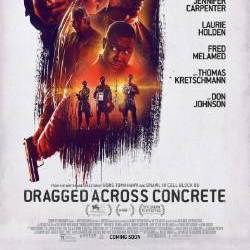
S. Craig Zahler's films in the past few years have only just keep getting better and better. Also how this guy was able to give careers back to Vince Vaughan & Mel Gibson is a feat if extraordinary skill too. Dragged Across Concrete is a complex story, with a lot of interesting twists and turns, but one of the best skills that Zahler has as a film maker is his ability to set up scenes. He never spoonfeeds his audience, and gives the characters dialogue and scenes that are very lifelike. While this may be his least bloodiest affair, it does have some rather upsetting moments in it which leave a bigger lasting impact than a bloody gore fest.
9. Once Upon A Time In Hollywood (Quentin Tarantino)
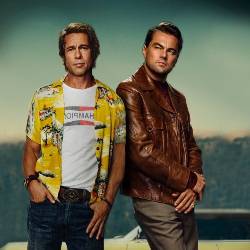
I was a tiny bit let down by Tarantino's last film The Hateful 8. Overall it wasn't the worst, but there was a lot of padding. But, this film has a lot of padding too. But it's padding which I deem necessary. In fact, this level of padding I haven't seen Tarantino do since Jackie Brown. But overall, the film, even though it is slightly based on true events, constantly has the audience guessing what is going to happen, leading to an incredibly leftfield and satisfying climax. The dialogue throughout is at times Tarantino by numbers, but at times he does verge away from what we are used to, which I've got to admit, is an impressive feat by Tarantino so late into his career. Also, big props to Leonardo DiCaprio who deserves an award for his performance in this film.
8. Fyre: The Greatest Party That Never Happened (Chris Smith)
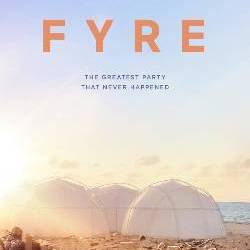
The movie which launched a thousand memes. Back in the day, documentaries used to fill my lists, but that has died down, because they've been so saturated since the rise of Netflix & Amazon. But, I'm glad to say that this is the example of one that has slipped through the cracks, mainly because the story of this documentary is so insane. A failed music festival that was doomed from day one, spearheaded by a rapper with a lot of hubris and a pied piper entrepreneur. In many ways this movie very much is the perfect parable of today's obsession with capitalism. It's all glitz with no results. Netflix, you've done it again.
7. Lords Of Chaos (Jonas Åkerlund)
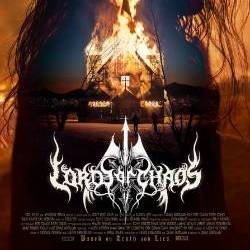
Being a fan of metal, the story of this film has been among the metal lore for the past few years. Now...do I believe everything the movie is portraying...no, but the movie does claim that it is based on lies too. But at the heart of it all, I think Åkerlund did get a great theme going. That at the end of the day, the guys involved in this whole affair were just kids. This is a controversial choice I know, but I genuinely loved the choice of shots in the movie, the aesthetics used and I thought out the dialogue throughout was very strong and acted well. So as a film, it's great. As a piece of metal history...not so much.
6. Fighting With My Family (Stephen Merchant)
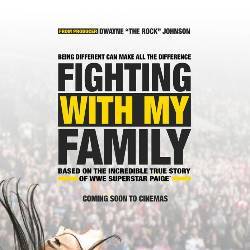
After being blown away by Florence Pugh in Lady Macbeth, I was surprised to hear that her next project was a comedy film about wrestling. But then I saw that Stephen Merchant was directing and writing it, and my mind was put to rest. Personally I think The Office & Extras are 2 of the best TV shows ever made, so I knew that Stephen could pull of a big Hollywood comedy. But...this has such great British charm in it, that whenever I wasn't laughing I was nearly in tears with the drama. The screen play in this film is fantastic, but Stephen has always been a brilliant writer. The cast in the film is fantastic, but Florence Pugh just blows everyone out of the water. I will talk about her more later.
5. Vice (Adam McKay)
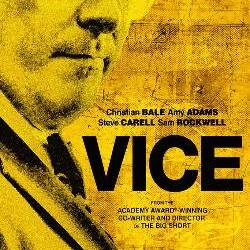
After being shocked by The Big Short, Adam McKay again proves that he has a certain style which was only veily shown in his earlier comedy films. The comedy of this film comes from the twist of what we usually except with films of this calibre, but behind the veneer of Cheney himself, this very much adds to the tone of the film. The obvious elephant in the room is Christian Bale's performance and the changes he made to become the character, which are insane as always, but the actual performance and manner of Cheney is perfectly modeled and may be one of his greatest performances, although I hope for his benefit he just sticks to a fat suit and make up next time he needs to play an older large man. Now this movie isn't the most factually accurate from what I gather, but if it is...wow...McKay has given life to an absolute monster.
4. Midsommar (Ari Aster)
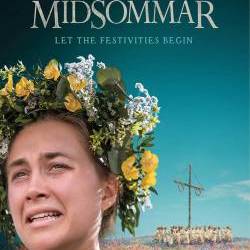
Ari Aster has now made 2 of the best modern horror films. Hopefully he can make it a hat trick. This film blew me away. The psychedelic cult aspect of this movie was dripping from the screen, but it was done is such a bright and vibrant way so it seems to be safe, but it's actually very dangerous. A fantastic cast also drives the film, but Florence Pugh shows up again to prove that she may be the greatest actor that we currently have working at the moment. Jack Reynor is also fantastic in the film and I really hope he gets more work because he is fantastic (he's gorgeous too). Warning to anyone about to watch this film...it gets very freaky.
3. Avengers Endgame (Anthony & Joe Russo)
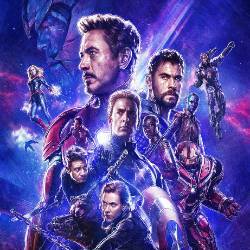
Ok...again this is mainly just for my own satisfaction. I have been following the Marvel films for a long time, and some of them have actually been able to get their way into my top 10 lists, but this one is different. This movie never would have worked if the studio didn't take their time. And the arc that they have told over the past few years with specific characters in general has come full circle, and the pay off is glorious. Now when it comes to the actual plot of the film and the time travel stuff...yes it is a bit silly, but the concept itself is silly too, so I take it with a pinch of salt, and I only focus on the story we are given. The best performance though comes from Robert Downey Jr., who I believe deserves some sort of award not for this film but for all the Marvel movies he took part in. The build up to Josh Brolin's Thanos is also a fantastic performance. And the climax of this film is one of the most grandiose and epic closers of any superhero movie that we have ever seen.
2. Us (Jordan Peele)
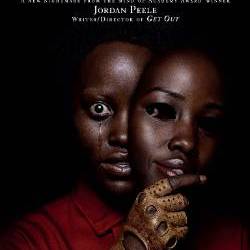
I felt that Get Out was a movie where the concept was brilliant, but the actual execution was lacking. I still enjoyed it, but it was one of those films where people enjoyed it a lot more than I did. But when I saw the trailer for Us, I became very excited, because the trailer made it seem overly creepy to the point where I didn't understand what was going on. So I went in knowing nothing and coming out completely blown away. To think that Jordan Peele directed this, the same guy that made me laugh from his sketches on Key & Peele has directed an incredibly smart, funny and interesting horror film. I feel like I'm in the Twilight Zone (obvious joke alert). But this movie would be nothing without the stellar performance from Luptia Nyong'o. This lady deserves a lot of awards and recognition for this role, and I hope she works with the horror genre again, because he is a fantastic scream queen.
1. The Favourite (Yorgos Lanthimos)

Yorgos Lanthimos' films have been an interest of while. With his directorial debut Dogtooth, I was blown away. It was so unique that no one could follow this incredibly odd turgid and absurdist style. He then came back with The Lobster, which I found the idea of more enjoyable than that actual execution of the film itself. And he got closer with The Killing Of A Sacred Deer, but it didn't fully stick to landing. But this is his biggest film. A weird one to chose foe a style of his calibre. A period piece focusing on feminism. How could he keep his style without it distracting the audience too much with the story. But thankfully he found the perfect marriage between the 2. Now, his style did get watered down a bit, but thankfully his absurdist approach hasn't fully evaporated, with some very odd but brilliant use of shots. Acting wise, the film has a fantastic cast, and obvious props should be given to Olivia Coleman who won her Oscar for this role, but Emma Stone & Rachel Weisz also give fantastic performances too, and should be recognized too. I'm glad to see Lanthimos making his acclaimed masterpiece, and am looking forward to his next artistic endeavor.
1 note
·
View note
Text
Podcast 188: Figure Section [aufnahme + wiedergabe] [ +Interview]
Figure Section arose from the meeting of Austrian-French musician and actress Olivia Carrère - aka Olive - and Belgian artist and producer Yannick Franck (RAUM, Orphan Swords, Mt Gemini), who first crossed paths on a theatre stage in Brussels.
Although founded on an acknowledgement of these styles, their execution is experimental, idiosyncratic and entirely modern in spirit, guided by an intent to revise their influences and an approach shaped by romanticism and a surreal, Dadaistic sense of humour. The recurrent themes of the project address friendship, love, loss, existential angst, survival, irony, degeneration, queer culture, non-conformity and ‘the expiation of tensions through modern day rituals’.
The duo’s first single ‘Teutonic Knights’ was hailed by The Brvtalist as an illustration of ”infectious wave [music] with an eerie atmosphere and frigid vocals”, a track that subsequently generated widespread acclaim. In October their debut EP was released on the cult Berlin based label run by Phillip Strobel, aufnahme + wiedergabe.
TF: What motivates you to create Figure Section?
O: My collaboration with Yannick is an intersection between a strong friendship and similar interests and tastes in music. What’s more, the collaboration between us is really complementary in the creative process and allows us to explore new musical playgrounds which neither of us would probably reach if we were working separately.
Y: There are certain musical realms I wanted to explore for a long time whilst doing very different projects (Orphan Swords, RAUM, Y.E.R.M.O.), and since we met and started to experiment together, we dreamed of having a proper duo. It took time but here we are, I am very glad the project exists and I couldn’t dream of a better companion to do it with.
TF: Tell us something about you. What’s your background? Where did you studied and who influenced you to explore musical processes?
O: My background is rather diverse, and it took me a long time to discover how intimate I was with music as a listener, but also as a composer. I come from a theatrical background. I trained as an actress, though I started my studies with a degree in communication – specifically in socio-cultural animation - knowing that I would change path after obtaining it. It’s quite funny to see how tortuous life can be before finding your way through and beyond all these experiences. When I started as an actress ten years ago, something was missing in my professional contribution. I was desperately looking for some creative language that I could develop on my own. I was already familiar with singing since my childhood, so I started learning the basics of music theory online, and quickly I realized that I wanted to compose songs, and to find the easiest way of recording them without any external help. I got my hands on a keyboard and software and started composing, singing and producing at home. It was more a secret process for a few years, until I created a solo piece in the National Theatre of Belgium, which involved performing some of my compositions. This was a fundamental step where I learned that, with the music, I could be really free in the writing and performing process.
Y: I studied painting, but it quickly became clear that music was a territory worth exploring and one that I had to invest my time and energy into. Since I was pretty disgusted by the blatant materialism and the general mindset of the art world; the galleries, and a lot of the attitudes adopted by other artists (competitiveness, individualism, tendency to follow an art world, scale version of the Star System), I found there would be more freedom making music. People attend a concert to have an experience. Anyhow I love art, all sorts of art and my friends are usually creative people. Also, there have never been any boundaries for me, you can build sonic sculptures or paint rhythms, you can conceive a concert as a performance, you can do whatever you want. I recently moderated a panel at BOZAR about the underground art scene in New York in the 80’s, in East Village in particular. I had the pleasure of interviewing Dany Johnson (she was a resident DJ at Club 57 and later at Paradise Garage), Leonard Abrams (he ran the fabulous magazine The East Village Eye) and Gil Vasquez (DJ and president of the Keith Haring Foundation) and what struck me was the fact that at that particular moment in that scene you had zero boundaries between visual art, music, dance, performance… Klaus Nomi shared the bill with Ann Magnuson and John Sex and Haring curated shows and painted almost 24/7 while listening to music. It was all about energy. It’s academicism and speculation (art as a luxury product) that kills such energies (and eventually did in that case) Two different problems, both normative and alien to any creative essence. I stumbled upon a Serge Daney quote lately: ‘Academicism is the aesthetics of nihilism.’ And I agree with that, once you “do things because that’s the way they’re done”, reproduce them in blind fidelity and separate, classify, and annihilate boundary breaking forces, you start producing numb, meaningless objects. In this case a painting has to go from a gallery to a living room or a collection where it belongs. Is it a nice base material for speculation or a good way to seem educated and exhibit your taste as a buyer, to impress others? Hell no…a painting is rather an expression of life itself, a celebration, an exhibition of the worlds revolting features, its horrors, its injustice, its sadness, qualities and themes such as these…in every case it is an essential, vital gesture. Otherwise why even take a look at it? Music should be just the same.
TF: Do you spend all your time for your musical activity or do you have another job?
O: Yes, I do now. The musical activity has taken the vast majority of my time even though I’m still performing as a theatre actress, but that part of my professional activity is becoming more and more scarce. I’ve been recently offered to create music for theatre. So, my work today is divided between Figure Section, and other emerging projects for which I compose and produce for other artists, and my work as a music composer for the theatre. Maybe one day I will come back to the stage with a performance in which I’ll be the actress as well as the musician. I do keep an eye on that prospect even though it’s not the priority for the moment.
Y: I teach sound in cinema. We analyze movies and their soundtracks most of the time. It is a very interesting way to make a living next to music making.
TF: How is your live set up going to be? Any particular equipment? What’s your favourite track to play live and why?
O: We are working on the simplest and most efficient way of touring. So, our set is based on live keyboard playing, voice mixing, and equalizing the tracks live. So, there’s no particular equipment at the moment.
Spectral Dance, is one of my favourites to play live. It’s a more nostalgic synthpop song that offers a vast sense of space for the vocals and the keyboard parts. I just love its simplicity, almost naïveté, contrasted by lyrics about pernicious ghosts from the past that try to keep us from moving forward.
Y: There is a lot of different processes and ideas colliding and merging in Figure Section. It is always quite challenging for us to write a new song and perform it on stage. I think my favourite live song is currently Disfigured Section. We both sing on that one and I love that. Lyrics and vibe wise it’s sort of a Neo Dada track, maybe a tad surrealistic too, from apparent nonsense a lot of sense can emerge from the lyrics. Also, it is nervous, rough, noisy, kind of pissed off. At the same time desperate and full of energy. A union of opposites.
youtube
TF: What new hardwares did you apply to make 'Spectre' LP? Do you have a particular method while working in the studio?
O: There’s no new hardware utilized, but we have a more precise choice of instruments these days as well as a particular approach in the production process. Yannick and I work just as well separately as together in the studio. It just helps us to be more efficient because of our very different schedules. We both share online a musical file filled with musical ideas, loops, drums and lyrics. We are both the composers and mixers of the songs, but Yannick is more the writer and the producer and I’m more the arranger and singer. I think that we have now reached the perfect balance in the creative process, which is almost symbiotic.
Y: Yes, it is super interesting because I never know where Olive is going to take a song to when she starts working on it with her great skills and sensibility. What I know is that great stuff will eventually happen, leading to things that will stimulate us and give us even more ideas.
TF: How do you compose this tracks? Do you treat them like musical narratives or more like sound sculptures or images?
O: It really depends on the material. Sometimes Yannick comes with a very complete composition and I add the keyboard and voice arrangements, sometimes I come with a proposition and he completes it. Our strongest asset as a duo is that we started music completely differently, Yannick as an electronic experimentalist and performer, and I as a pop songwriter and singer. So, what we do is bring these assets together in our songs. I think the first track of the Spectre release is the perfect example of that symbiosis. This is what we aim for.
Y: Yes, it is a creative adventure, we have no such thing as a clearly established routine, it’s more laboratory like. It is not “experimental music” but the way it is done is not conventional either.
youtube
TF: Any movie, documentary, album (not electronic music) that you would like to share with our readers?
O: We are big fans of horror, thrillers and sci-fi. The last movie that left me fascinated as well as horrified is Midsommar by Ari Aster. I loved that movie because its director knows how to subtly inject weird elements of comedy that make you feel uncomfortable, as well as conveying an ice-cold intrigue about ancient pagan practices and rituals. Loved it.
Y: +1 for Midsommar. I loved that the movie never seems to bring any judgment about the neo-pagan community it depicts, it is just utterly different from what we know but it seems to make sense no matter how shocking it can be. It gives us a break from the ethnocentric attitude of many North Americans and from the extreme arrogance of modern western civilizations, which seem to be absolutely convinced of their superiority to any previous or different civilizations. Also, the visual effects are amazing. Der Goldener Handschuh (The Golden Glove) was quite a great movie too. Being utterly disgusted by this ugly, messy, desperate serial killer’s gruesome murders without being able to restrain myself from laughing was for sure a wild experience. And it really triggers thoughts afterwards. Moral thoughts especially. I found it pretty strong. A non-electronic album: Lux perpetua by Ensemble Organum, which is a very particular version of the Requiem by Anthonius de Divitis. It is such a beautiful requiem and such an incredible interpretation; it even features throat singing which is very unusual in the context of European polyphonic reinterpretations. 15th century art tends to focus a lot on death and mortality. And as Regis Debray said in his 1992 book The Life and Death of Images: “Where there is death there’s hope, aesthetically speaking.”
TF: What are the forthcoming projects?
O: Wrapping up our debut LP.
Y: We are also planning tours, confirmed dates are in Israel and the US so far but more will be announced later on. It would be fabulous to come play in Mexico too!
source https://www.tforgotten.org/single-post/Podcast-188-Figure-Section-aufnahme-wiedergabe-Interview
1 note
·
View note